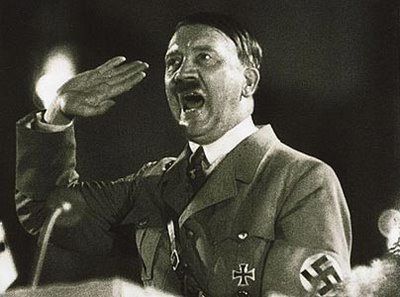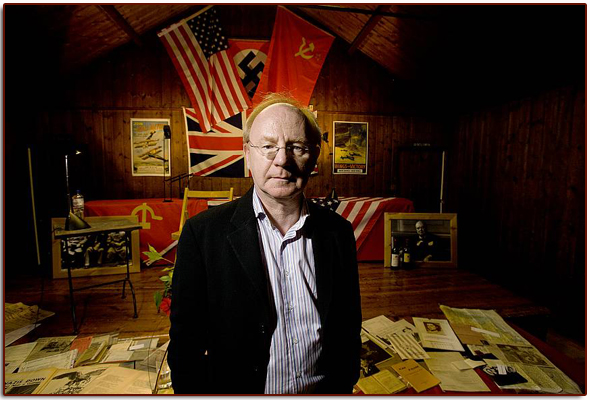 On April 21, as a prelude to the celebration of World Book Day in Madrid and other cities in Spain, the daily El Pais published a review by Antón Jacinto of The Dark Charisma of Hitler, by the British historian Laurence Rees, who analyzes the personality of the great German dictator and the capacity of hatred as an element of popular leadership. I attach major pieces of that article because it made me think of F. Castro and other “charismatic tyrants” in Latin America who combine hatred with the terror and mass manipulation.
On April 21, as a prelude to the celebration of World Book Day in Madrid and other cities in Spain, the daily El Pais published a review by Antón Jacinto of The Dark Charisma of Hitler, by the British historian Laurence Rees, who analyzes the personality of the great German dictator and the capacity of hatred as an element of popular leadership. I attach major pieces of that article because it made me think of F. Castro and other “charismatic tyrants” in Latin America who combine hatred with the terror and mass manipulation.
“We know almost everything about Adolf Hitler, but irreducible secrets of his personality and leadership remain. For the famous British historian and documentarian Laurence Rees (Ayr, Scotland, 1957), none are greater than how he managed to drag along with him, in the terrible cycle of war and genocide, millions of Germans. To try to clarify that and to explain the keys to the fatal attraction of the Nazi leader, the author of Auschwitz, Horror in the East, Their Darkest Hour, and Behind Closed Doors, has dedicated his new book, The Dark Charisma of Hitler. Rees highlights the features of Hitler “his unlimited capacity for hatred.” He warns: “The power of hate is undervalued. It is easier to unite people around hatred around than any positive belief.”
As a person, says Rees, Hitler was quite unfortunate. “Badly damaged” psychically, incapable of true friendships and affections, bathed in hatred and prejudice. “Lonesome and with a vision of life as a struggle and human beings like animals.” But he had charisma. “We tend to think that charisma is a positive value, but despicable people may have it,” he muses.
Rees says, “The most important thing to understand that Hitler’s charisma depended on people. Charisma does not exist offline. You cannot be charismatic on a desert island. Much of what makes it is the other… Yes, the idea is that when we feel a special connection with someone we believe that depends on this person but actually it depends partly on us. Hitler’s charisma came from both the people who followed him as well as himself… “
Rees explains how among the Germans themselves the influence of Hitler’s charisma resulted in changes. “People who saw him as a ridiculous or disturbed in 1928 came to consider him as a savior in 1933.” There were always, however, people immune to his charisma. Philipp Von Boeselager, who conspired to kill him, found him outrageous and said it was disgusting to watch him eat: a boor. “Well, but you have to remember that … unconventional times require unconventional leaders.”
People had to be predisposed to follow Hitler, says Rees, although he, the leader, brought his intransigence, his absolute sureness of his role as a providential figure, his ability to connect with the hopes and desires of millions of Germans, their uncontrolled emotions and, above all, his contagious hatred. “One of the hardest things in the world is accepting the blame and responsibility for yourself, we are all predisposed to project our frustrations on the other, in the form of hatred.”
Did Hilter’s success depend on his charisma? “Yes, this aspect was vital. If someone says he will do something extraordinary and he does, the next time it is easier for you to have faith. Hitler played strong, all or nothing, and every victory strengthened his charisma. Many military, for example, who looked at him with suspicion, surrendered to his genius, his intuition, the famous Fingerspitzengefühl, after a long series of victories that seemed inexplicable…”
So, how did his charisma survive the failure at Stalingrad? “Unlike Mussolini, Hitler dismantled the structures of the State, so it was more difficult separate him from power, in addition, he had instilled fear of the Red Army in the Germans and their revenge, which would happen at the defeat and although Hitler would be gone, and of course Hitler increased the terror of his repressive apparatus in direct proportion to the loss of his charismatic leadership.”
Hitler cultivated his charisma … “including in many small ways. He wore glasses, but never let himself be seen or photographed in them. He carried a magnifying glass. They even fabricated a special typewriter with large characters to write the texts he had to read … He also studied his image in the mirror and practiced his famous glare.”
Rees points out the differences between Hitler and Stalin in terms of charisma. “Stalin practiced negative charisma, the entire image of Hitler seemed hollow. Under Stalin there were no rules to avoid being killed. No one was sure. In Nazi Germany it was clear who would be persecuted by the regime, in the Stalinist USSR, no. Stalin used fear like Hitler used hatred.”
25 April 2013

